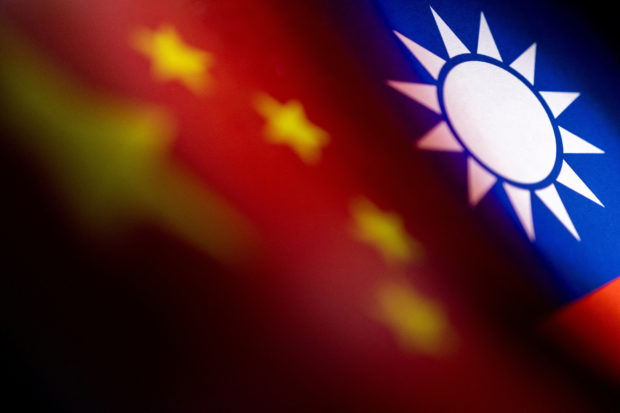Seven decades of China-Taiwan tensions

Chinese and Taiwanese printed flags are seen in this illustration taken, April 28, 2022. Picture taken April 28, 2022. REUTERS FILE PHOTO
TAIPEI — As tensions between the US and China soar over a visit by US House Speaker Nancy Pelosi to Taiwan, AFP looks back at relations between the self-governing island and its superpower neighbor.
1949: separation
Mao Zedong’s communists take power in Beijing in October 1949 after defeating Chiang Kai-shek’s Kuomintang (KMT) nationalists in a civil war.
The KMT flee to the island of Taiwan and form their own government in Taipei in December, cutting off contacts with mainland China.
In 1950, Taiwan becomes an ally of the United States, which is at war with communist China in Korea. The US deploys a fleet in the Taiwan Strait to protect its ally from possible attack.
1971: Beijing gets UN, US nods
In October 1971, Beijing takes over China’s seat at the United Nations, previously held by Taipei.
In 1979, the United States cuts formal ties with Taiwan and establishes diplomatic relations with Beijing instead.
Washington expresses support for the “One China” policy, which states that Taiwan is part of China, but maintains trade and military ties with Taipei.
1987-2004: relations improve
In late 1987, Taiwan residents are for the first time permitted to visit mainland China, allowing families to reunite.
In 1991, Taiwan lifts emergency rule, unilaterally ending a state of war with China. The first direct talks between the two sides are held in Singapore two years later.
But in 1995, Beijing suspends talks in protest at a visit by Taiwanese president Lee Teng-hui to the United States.
In 1996, China tests missiles off Taiwan to deter voters in the island’s first democratic presidential election.
In 2000 elections, the KMT loses power in Taiwan for the first time. Over the next few years trade links between the two sides improve.
2005-2015: threats and talks
In March 2005, Beijing adopts a law authorizing the use of force if Taiwan declares independence. In April, KMT chairman Lien Chan makes a landmark visit to Beijing for talks with Chinese leader Hu Jintao.
In 2008, Taiwan and China resume high-level talks after the KMT’s Ma Ying-jeou is elected president on a Beijing-friendly platform.
In 2010, they sign a sweeping Economic Cooperation Framework Agreement and in 2014 hold the first government-to-government talks since separation.
2016: honeymoon over
In January 2016, Tsai Ing-wen, from the traditionally pro-independence Democratic Progressive Party, wins presidential elections.
In June, China suspends all communications with Taiwan after the new government fails to acknowledge the “One China” policy.
In December 2016, US president-elect Donald Trump breaks with decades of US diplomatic policy by speaking directly, by telephone, with Tsai.
In January 2019, Xi Jinping warns that the unification of China and Taiwan is “inevitable”.
2021: US-China tensions
In 2021, Chinese military jets make hundreds of incursions into Taiwan’s defense zone.
In October, US President Joe Biden says the United States will defend Taiwan if China attacks it, in comments later partly walked back by the White House.
Tsai confirms that a small number of US troops are present in Taiwan to help train its forces.
2022: Tensions spike over Pelosi visit
On May 23, Biden urges the West to stand firm against Russia over Ukraine to deter China from trying to take Taiwan by force, and repeats that the US will defend Taiwan in the event of an invasion.
On August 2, House Speaker Pelosi defies days of Chinese warnings and lands in Taiwan during an Asian tour.
The highest-profile elected US official to visit Taiwan in 25 years, Pelosi says her visit demonstrates Washington’s strong commitment to the island.
China slams the United States’ actions in Taiwan as “extremely dangerous” and vows to launch “targeted military actions” in response to the visit.
RELATED STORIES
Chinese military drills breach Taiwan waters, endanger international order—Taipei
Chinese military to hold live-fire exercises in East China Sea
US’ one-China policy has not changed with Taiwan visit–Pelosi, White House